NEJ 2024 Wrap-Up
By Erik Alsgaard*
Photos by James Lee
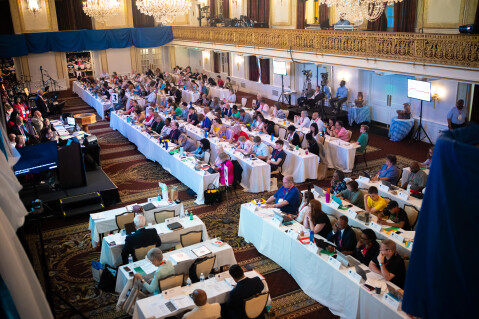 The 2024 Northeastern Jurisdictional Conference reduced its episcopal areas from nine to six during its meeting in Pittsburgh July 10-12. An episcopal area is a geographic area consisting of an annual conference or conferences to which a bishop is assigned by the Jurisdictional conference. Within the area, the bishop presides over the work of one or more annual conferences.
The 2024 Northeastern Jurisdictional Conference reduced its episcopal areas from nine to six during its meeting in Pittsburgh July 10-12. An episcopal area is a geographic area consisting of an annual conference or conferences to which a bishop is assigned by the Jurisdictional conference. Within the area, the bishop presides over the work of one or more annual conferences.
After hearing an extensive report and approving a motion from its Committee on Episcopacy, the new configuration will see eight annual conferences sharing a bishop and two conferences with one bishop. The decision was affirmed by a 123 to 19 vote.
The new episcopal areas, which will be re-named after consultation with CONAM – the Committee on Native American Ministries – comprise these conferences:
- Baltimore-Washington and Peninsula-Delaware;
- Eastern Pennsylvania and Greater New Jersey;
- New York and New England;
- Susquehanna and Upper New York;
- Western Pennsylvania; and
- West Virginia
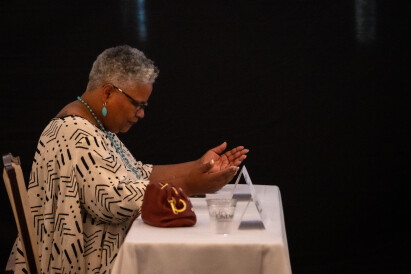 Since 2022, Bishop LaTrelle Easterling has been assigned to the Baltimore-Washington Conference and provided coverage to the Peninsula-Delaware Conference. With the creation of the new area, she has been assigned to both.
Since 2022, Bishop LaTrelle Easterling has been assigned to the Baltimore-Washington Conference and provided coverage to the Peninsula-Delaware Conference. With the creation of the new area, she has been assigned to both.
Eastern Pennsylvania and Greater New Jersey have also shared a bishop, and supervision of the Susquehanna Conference has been shared by the bishops of the Western Pennsylvania and West Virginia conferences.
Cross-Jurisdiction Episcopal Assignment
Perhaps the biggest news coming out of the NEJ, in the absence of electing any new bishops, was the assignment of Bishop Debra Wallace-Padgett to the West Virginia Conference.
In a creative, rarely-if-ever-seen-before move, Bishop Wallace-Padgett will serve as bishop of West Virginia as well as bishop of the Holston Annual Conference. This two-point charge is unique because it crosses jurisdictional boundaries: Holston, located in Tennessee, is in the Southeastern Jurisdiction (SEJ), while West Virgina, of course, is in the NEJ.
Creed Pogue, a lay delegate from Greater New Jersey, made a motion to remove Bishop Wallace-Padgett from the list of “effective bishops,” citing Discipline Paragraphs 524, 49, and 512. Since this is not a transfer, he said, she would be serving in two colleges of bishops.
Presiding at the time, Bishop LaTrelle Easterling ruled that motion out of order, saying the Jurisdictional Conference does not vote on effective bishops.
“That’s the work of the Committee on Episcopacy and they have taken that action and approved those bishops,” she said.
The arrangement to share a bishop with the SEJ was a solution arrived at when it was learned that no bishops were willing to transfer to the jurisdictions (NEJ and the Western Jurisdiction) that would not have enough to meet the allocation approved by the General Conference.
Judy Kenaston, chair of the Jurisdictional Committee on the Episcopacy (COE), told delegates that by Discipline, an episcopal transfer requires the approval of the sending jurisdiction COE, the receiving jurisdiction COE, and the bishop being transferred.
On July 10, Kenaston elaborated saying that due to a ruling that only those bishops elected before 2022 are eligible for transfer, there were only 15 bishops eligible for transfer and four of those are already serving in the NEJ. Kenaston also said the shared bishop will serve in a conference that borders the SEJ and “we look at this as an assignment, not coverage.”
The assignment of Bishop Wallace-Padgett also created a request from the NEJ to the denomination’s Judicial Council for a ruling of law on whether such a cross-jurisdictional assignment is permitted under church law.
In part, the request reads, “The Northeastern Jurisdictional Conference requests a Declaratory Decision on the constitutionality, meaning, application, and effect of ¶48 or any other constitutional or disciplinary paragraph on the decision of the Northeastern Jurisdictional Conference to assign an individual Bishop to two annual conferences across two Jurisdictions. Specifically, is it permissible for a Bishop to be assigned to two annual conferences across two Jurisdictions and hold membership in two Colleges simultaneously? Is it permissible for a Bishop to be assigned to two annual conferences across two Jurisdictions and hold membership in only one College?”
The Judicial Council – the church’s highest court – is expected to take up the matter at its next regularly scheduled meeting.
Youth at the NEJ
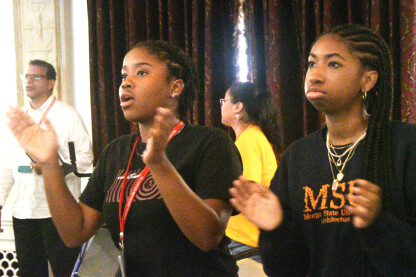
Before the NEJ began its work on July 11, Bishop Thomas J. Bickerton, serving as chair of the meeting, spoke to the youth. He said that there were 19 youth observers as well as some youth delegates at this year’s NEJ.
Singling them out, the bishop spoke about his own experience at a Jurisdictional Conference more than 40 years ago, and how that turned an 18-year-old wanna-be optometrist into an ordained clergyperson.
“In 1976, at the NEJ in Bridgeport, Connecticut, I found my way into the ministry,” the bishop said. “I thought I was going to be an optometrist.” The bishop paused. “Youth – God is knocking on your door, too. It may not be ordained ministry, but God has a purpose for you. Thank you for being here.”
Ryan Taylor, who was observing from the Baltimore-Washington Conference, attended her first NEJ session. “I’m having a great time and I’ve met a lot of amazing people,” she said.
One highlight of the NEJ occurred when an offering was taken for two ministries that impact on youth and young people.
When Bishop Hector Burgos announced that the offering received for Kidcelerate, a child enrichment program in Pittsburgh, had raised $3,000, his colleagues on the College of Bishops rose to announce that they would match the amount with an additional $3,000.
Bishop Thomas J. Bickerton then stood to ask, “Can we offer a challenge for even more?”
The answer was a resounding “yes,” with conferences, churches, individuals, and a foundation responding. A delegate reminded the body about the request for an offering to support Mission of Peace and donations were made for that, too. It was announced that in just the time of the challenge that evening, more than $22,000 was raised for Kidcelerate and $3,500 was raised for Mission of Peace.
In other youth news at the NEJ, delegates approved an aspirational motion brought by Ryan Fox, youth representative from the Western Pennsylvania Conference, that encouraged the annual conferences of the Northeastern Jurisdiction to set aside two seats on their delegations for voting youth.
History in the Making
When Bishop LaTrelle Easterling chaired the opening business plenary session Wednesday at the NEJ, she became the first African-American woman to sit in the chair in the history of the jurisdiction.
In its business session Thursday morning, the NEJ again witnessed history as a Latino bishop presided for the first time. Bishop Hector Burgos, who was elected in 2022 as the NEJ’s first Latino bishop, made only a brief reference to this fact as business got under way.
During his time in the chair, Bishop Burgos presided over the Nominations Committee report, presented by Bishop Peter Weaver. After delegates instructed the Nominations Committee to return to its work and perfect the document, Bishop Weaver said that the committee was bringing forth new people in new spots by a unanimous vote. “This is another step in trying to have our actions match our words,” he said.
NEJ Finances
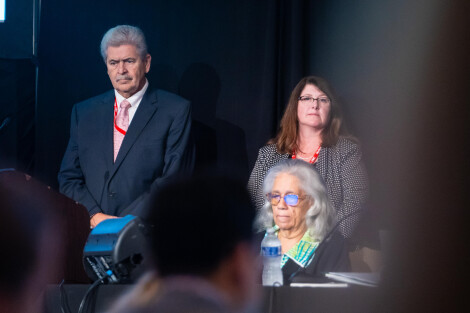 NEJ delegates approved the 2025-2028 budget by an overwhelming margin, 136 to 3.
NEJ delegates approved the 2025-2028 budget by an overwhelming margin, 136 to 3.
The budget calls for expenditures of $1.28 million, or a 15 percent cut, across the board, except for line items such as salaries, benefits, and other fixed costs, according to the Rev. David Simpson, who once served as Bishop Felton May’s Assistant to the Bishop in the Baltimore-Washington Conference.
After the vote, Bonnie Marden offered a motion that the NEJ finance committee be encouraged to invest the money with United Methodist investment institutions, such as foundations or Wespath. “I think it’s time to invest in our own investment resources,” she said. “It also ensures a socially responsible investment.” The motion passed, 135 to 7.
Simpson, who concluded his time as NEJ treasurer at this session after 20+ years of service, then presented the apportionments for the next quadrennium. After carefully walking through the numbers, delegates approved $968,135 for 2025-2028. Each annual conference shares the responsibility of this, Simpson said. He noted earlier that for the 2020-2024 quadrennium, every annual conference had paid 100 percent of its apportionments. The apportionments were approved, 134 to 5.
Confronting Racism
The NEJ heard from the Rev. Giovanni Arroyo, a delegate from the Baltimore-Washington Conference who serves as General Secretary of the General Commission on Religion and Race. Arroyo brought a report from a task force that was created by the NEJ to work on dismantling racism.
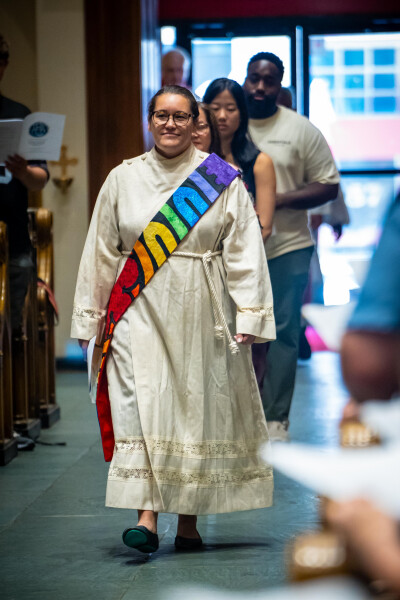 “One of the challenges as a denomination is that we continue to confront the historical reality of our racism,” he said. Before delivering the report, Arroyo briefly shared that he had been nominated as a candidate for the episcopacy in the Western Jurisdiction, and even though his candidacy did not move forward, he prayed for that group.
“One of the challenges as a denomination is that we continue to confront the historical reality of our racism,” he said. Before delivering the report, Arroyo briefly shared that he had been nominated as a candidate for the episcopacy in the Western Jurisdiction, and even though his candidacy did not move forward, he prayed for that group.
Arroyo said that Bishop Bickerton had reminded the NEJ during his “State of the Jurisdiction” report of the important work of dismantling racism in every area of our lives and the church.
“The journey toward racial justice is long and fraught with both progress and setbacks,” he said. “We have a racist history that has caused harm and, sometimes, we have replaced harm with another harm.”
Arroyo said that the NEJ’s 2016 “Call to Action” resolution was a signature milestone, urging the Jurisdiction to confront and dismantle systemic racism and calling each of us to be agents of change. This work has continued at different levels in every annual conference.
Arroyo highlighted the upcoming work of the NEJ Anti-Racism Working Group, which will be accountable to the Vision Table. The working group will engage the NEJ College of Bishops and annual conferences in at least five areas: 1) Leadership commitment; 2) Fostering conversations on racism, power, and privilege – to facilitate dialogue, encourage conferences and local congregations to host regular opportunities to talk about racism and share personal stories; 3) Continuing work of training – assisting in identifying resources and training, workshops, etc.; 4) Jurisdictional Audit – a comprehensive audit of racial equity in the NEJ, for example, in which churches have closed and the candidacy process among other areas; and 5) Partnering with racial and ethnic plans throughout the church.
“I am confident that together, by God’s grace, we can build a church that honors the dignity and worth of every individual,” Arroyo said. “The work is not just about implementing policies and fulfilling obligations. This is not about checking a box. It is about embodying the love and justice of Christ. It’s about transforming our church.”
State of the Jurisdiction Report
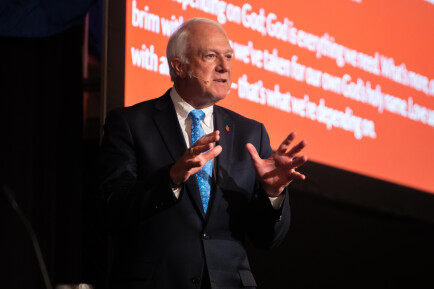 United Methodists stand at the ribbon cutting of a new church, but the question is: Are we ready to walk through the door? And, if so, will we do it together?
United Methodists stand at the ribbon cutting of a new church, but the question is: Are we ready to walk through the door? And, if so, will we do it together?
Those were just two of the questions Bishop Thomas Bickerton posed to the NEJ on July 10 during a 55-minute “State of the Jurisdiction” address.
After outlining six key corporate management principles, Bishop Bickerton explained that the seventh — “shared values” — is the capstone that holds the other concepts together. Without shared values, he said, things quickly fall apart.
“What we have now is the ribbon cutting on the beginnings of the next expression of Methodism,” Bishop Bickerton said. “The door has now been unlocked and opened for us to take our shared values and create the elements, relevant elements, for the ministry in this modern context.”
He cited the recent actions at General Conference as evidence of what can happen when people gather around a set of shared values.
“Most of us in this room were witnesses of that very thing,” Bishop Bickerton said. “What was truly miraculous was to witness a new set of expressions to our shared values being approved – get this – on a consent calendar! Are you kidding me?”
We have been fighting in this denomination for decades, he noted. “And yet, we found ourselves in a position where there was an ‘awakening’ and a ‘resolve.’ And it was beautiful!”
Bishop Bickerton confessed that the actions of our General Conference made him proud once again to be a United Methodist.
“We are now in a position to create a new, relevant, and responsive set of practices that will give us a chance, a real chance, to once again become a movement of grace, hope, joy, love, and justice. And, God knows, we need the injection of grace, hope, joy, love, and justice in a country that is about as close as you can get to a civil war without having a civil war,” he said.
Bishop John Schol Retires
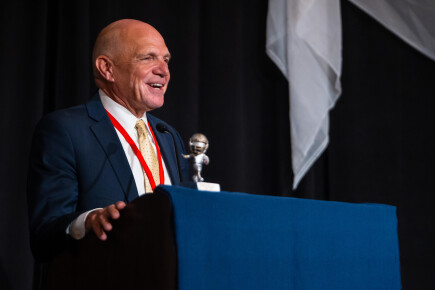 The 2024 Northeastern Jurisdictional Conference honored Bishop John Schol at his retirement celebration July 10, praising his innovative, entrepreneurial leadership as a carryover from his early days as a high school and college football quarterback. Bishop Schol served the Baltimore-Washington Conference from 2004 to 2012.
The 2024 Northeastern Jurisdictional Conference honored Bishop John Schol at his retirement celebration July 10, praising his innovative, entrepreneurial leadership as a carryover from his early days as a high school and college football quarterback. Bishop Schol served the Baltimore-Washington Conference from 2004 to 2012.
On behalf of the NEJ College of Bishops, Bishop Jane Middleton (retired) affectionately chided and lauded Bishop Schol for his problem-solving gifts and groundbreaking accomplishments. Her praise ranged from his “amazing feats” as director of the Frankford Group Ministry (FGM) in Philadelphia—his first pastoral appointment—to his work contributing to the development of the denomination’s Communities of Shalom and Holy Boldness at the General Board of Global Ministries, and then to his 20 years as a bishop of three conferences: Baltimore-Washington, Greater New Jersey and Eastern Pennsylvania.
Bishop Schol credited his wife, Beverly Schol, for helping him and caring for their family during his busy, well-traveled ministry career.
He also praised the talented, dedicated people who worked with and for him in his pastoral and episcopal career, teaching, encouraging and supporting him, and “doing amazing things that made me look good.” Bishop Middleton gifted him with a bobblehead football player. And Greater New Jersey and Eastern Pennsylvania delegates prompted him to lead a Philadelphia Eagles cheer and fight song, before he received a standing ovation from the crowd of nearly 200.
A Cross Returns to Pittsburgh
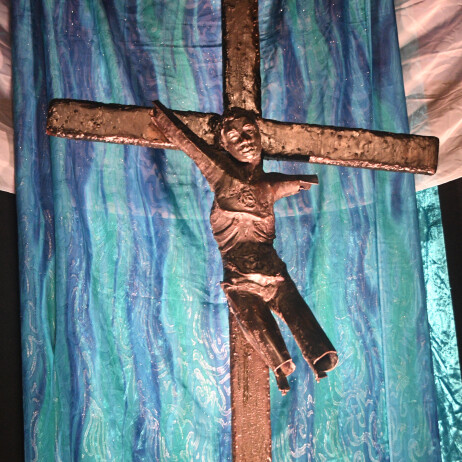
Delegates and visitors were made aware of this history and promise on July 9.
At the 1964 General Conference, which also took place in Pittsburgh, civil rights advocates carried a cross that was burned by the KKK on the lawn of Tougaloo College Chaplain, Ed King, who was working for desegregation in Jackson, Miss.
The Rev. Gerald Forshey was among the organizers of the General Conference protest known as the Pilgrimage to Pittsburgh. The march was in response to the church’s policy of voluntary rather than mandatory integration, which they said only perpetuated injustice.
“We did not like the burning of the cross,” King had said, “but we kept it as a symbol. It would not intimidate us.”
It was at Rev. Forshey’s request that artist John Kearney turned that burned cross into the bronze sculpture titled “Crucifixion.”
In recounting the cross’s origins, Rev. Amy Wagner, pastor of St. Paul’s UMC near Pittsburgh, spoke of the Tougaloo students’ efforts to worship at Jackson’s white Methodist churches.
“Week after week the students showed up with their Bibles ready to sing and pray with their fellow Methodists. They were persistent and determined,” she said, “and to our shame, Methodist churches would not receive them.”
Rev. Eric Carr, coordinator for the NEJ Black Methodists for Church Renewal, said the segregation of Black Methodists into the Central Jurisdiction “is said to be Methodism’s original and central sin, whose residual effects are still visible and felt in the denomination even today.”
The 2028 NEJ
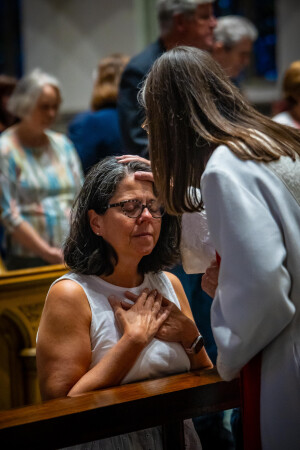 Conference Delegates accepted the invitation offered by Rev. Bill Mudge and Carmen Vianese to hold the 2028 NEJ Conference in the Upper New York Conference. “We can’t wait to welcome you with open arms and warm hearts,” Vianese said. In their video presentation, however, the delegates from Upstate New York would not promise there wouldn’t be snow even in July.
Conference Delegates accepted the invitation offered by Rev. Bill Mudge and Carmen Vianese to hold the 2028 NEJ Conference in the Upper New York Conference. “We can’t wait to welcome you with open arms and warm hearts,” Vianese said. In their video presentation, however, the delegates from Upstate New York would not promise there wouldn’t be snow even in July.
*Rev. Erik Alsgaard serves as pastor at Community UMC in Crofton, Md. Beth DiCocco and John Coleman contributed to this report. The Rev. James Lee is the Director of Communications for the Greater New Jersey Annual Conference.
